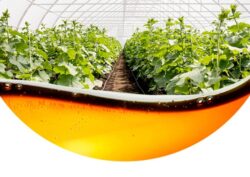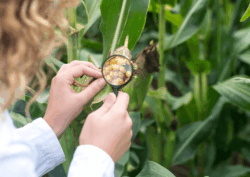In modern agriculture, the use of synthetic chemical products to control pests and diseases has raised concerns due to their negative effects on human health, wildlife, and biodiversity. In this context, neem oil has emerged as a natural and effective alternative for pest management in crops. This oil is extracted from the seeds of the Azadirachta indica tree, commonly known as neem. It has been used for centuries in traditional medicine and has now become a prominent biorepellent in agriculture.

What is Neem Oil?
Neem oil is an organic biorepellent widely used in ecological farming. Its natural origin makes it a safe alternative to synthetic repellent and a valuable tool in Integrated Pest Management (IPM).
Neem oil is known for its effectiveness as a repellent, targeting pests such as whiteflies, thrips, aphids, beetles, leafminers, and more. It disrupts the hormonal systems of insects, preventing their development and reproduction.
One of its main active compounds, azadirachtin, also has acaricidal properties—effective against red spider mites—and nematicidal properties, acting both in the soil and on plants. Additionally, it works as a natural fungicide, helping to prevent and reduce the presence of pathogenic fungi such as powdery mildew, downy mildew, Botrytis, and Alternaria, which can compromise crop health.

Repellent Properties of Neem Oil
Neem oil acts in several ways to control agricultural pests:
- Disruption of insect life cycle: Azadirachtin interferes with the molting process, preventing larvae from maturing into adults. It also reduces their feeding activity, slowing growth and eventually causing pest death.
- Natural repellent: Neem oil repels a wide range of insects, deterring them from approaching or feeding on treated plants. This is due to neem’s volatile compounds, which insects find unpleasant.
- Fungicidal effect: Besides its repellent properties, neem oil has antimicrobial characteristics that help protect plants from fungal diseases, thereby strengthening overall crop health.

Uses of Neem Oil in Agriculture
Neem oil is used in various agricultural contexts, from small-scale gardens to large commercial farms. Key applications include:
- Pest control in vegetables and fruit crops
Neem oil is commonly used to control insects that attack fruits and vegetables, such as aphids, whiteflies, thrips, caterpillars, and mealybugs. It effectively combats common pests without harming crops or beneficial insects like bees and ladybugs.
- Protection of ornamental plants
In gardens and ornamental plantings, neem oil is used to combat mites, beetles, and ants. Its application helps maintain plant health without relying on aggressive pesticides that could harm the environment.
- Use in organic farming
Neem oil is one of the few biorepellent approved for use in organic agriculture, as it is naturally derived and leaves no toxic residues. This makes it especially popular among farmers committed to sustainable practices. - Soil pest control
- Neem oil can also be applied to the soil to combat pests that develop underground, such as beetle larvae and nematodes. Treating the soil with neem oil reduces pest populations without affecting beneficial soil fauna.

Advantages of Neem Oil in Agriculture
Neem oil stands out as a safer option compared to synthetic repellents. It poses no toxicity to humans, animals, or beneficial insects, making it a less harmful alternative for both farmers and the environment. It is also completely biodegradable, meaning it does not persist in the environment or contribute to soil, water, or air pollution.
Another advantage is that pests do not readily develop resistance to neem oil, making it ideal for long-term pest control without the resistance problems often associated with chemical pesticides. Moreover, neem oil protects agricultural biodiversity by acting selectively—targeting only harmful pests while sparing non-harmful insects and other organisms within the ecosystem.

Considerations When Using Neem Oil
While neem oil is safe and effective, the following recommendations should be followed for proper use:
- Correct dilution: Neem oil must be properly diluted before application to avoid damaging plants.
- Application timing: For best results, apply neem oil early in the morning or late in the afternoon, when temperatures are lower and pollinators like bees are less active.
- Repeat applications: Neem oil should be applied every 7 to 14 days to ensure its effectiveness, as its action is not immediate and may require regular treatments to maintain control.
Combination with other products: It can be combined with potassium soap for a more complete action on treated crops, acting as both a contact and ingestion biorepellent.

In a world increasingly aware of the importance of responsible agricultural practices, neem oil serves as a valuable alternative for addressing current challenges, protecting plant health, soil, and the environment naturally. By integrating it into crop management programs, it not only promotes healthier and safer agricultural production, but also contributes to preserving biodiversity and building more resilient, sustainable farming systems in the long term.

